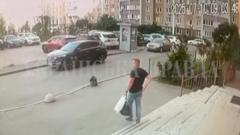With a self-declared three-day pause in hostilities on the horizon, Ukrainians express deep mistrust towards Russia’s motivations, questioning the sincerity of the ceasefire amidst ongoing attacks and past violations. President Zelensky has rejected the proposal, highlighting the need for solid guarantees for Ukraine's safety.
Ukrainians Skeptical of Putins Proposed Ceasefire Amid Ongoing Strife

Ukrainians Skeptical of Putins Proposed Ceasefire Amid Ongoing Strife
As a three-day ceasefire is proposed by Russia, skepticism reigns in Ukraine regarding Moscow's intentions, with many viewing it as a strategic ruse rather than a genuine peace offering.
Russia has announced a three-day ceasefire that coincides with the anniversary of the end of World War Two. This proposition, however, has drawn sharp criticism from Ukrainian leaders and citizens alike, with President Volodymyr Zelensky dismissing it as mere “theatrical show.” On May 9, Russia will observate Victory Day, but this proposed lull in fighting contrasts starkly with Ukraine's experiences of intensified shelling in recent weeks, fueling skepticism among those most affected.
The suggestion came from Vladimir Putin, who turned down a more substantive proposal from the Trump administration for a 30-day ceasefire and negotiations accepted by Ukraine. Ukrainian sentiments reflect a widespread distrust of Russia’s intentions, with polls revealing that around 95% of the population is skeptical of any overtures from the Kremlin. Residents like Tetyana Kondratenko from Sumy describe the situation on the ground as worsening, recalling that previous ceasefires have often served as deceptive tactics employed to regroup and intensify attacks.
Zelensky’s outright rejection of the three-day break comes alongside his insistence that Ukraine will not agree to ensure safety for the Russian military’s celebrations in Red Square. Opinions among Ukrainians are divided; while some desire even temporary respite from violence, there is a strong undercurrent of mistrust. Antonina Sienina from Zaporizhzhia, who has suffered personal loss due to the conflict, expressed mixed feelings about the ceasefire, recognizing the toll the war has taken on civilians.
In Kyiv, the capital city, recent nights have been punctuated by drone and missile strikes, resulting in casualties among civilians. The mayor of Moscow reported interceptions of Ukrainian drones, while the Kremlin insisted that these attacks wouldn't affect their plans for a ceasefire. Nonetheless, many Ukrainians perceive this development as a mere propaganda stunt aimed at framing Moscow’s continued aggressive posture.
As the death toll amongst civilians continues to rise— with at least 848 deaths recorded in April alone— the urgency for a real and lasting ceasefire grows stronger among the populace. Some feel the weight of fatigue and desire for peace could necessitate short-term sacrifices, even though they remain wary of any potential traps laid by Russia.
Military analysts reiterate Ukraine’s readiness for a true ceasefire, refusing to engage in what they consider Putin's tactical games. As the situation remains fluid, many Ukrainians cling to the hope for genuine peace, while bracing themselves for continued conflict.























